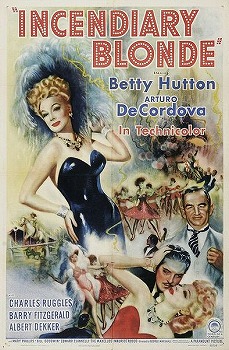| Incendiary Blonde | |
|---|---|
 theatrical release poster | |
| Directed by | George Marshall |
| Written by | Contract writer: Ken Englund James Edward Grant |
| Screenplay by | Claude Binyon Frank Butler |
| Produced by | Joseph Sistrom |
| Starring | Betty Hutton Arturo de Córdova Charles Ruggles Barry Fitzgerald Albert Dekker |
| Cinematography | Ray Rennahan |
| Edited by | Archie Marshek |
| Music by | Robert Emmett Dolan John Leipold |
Production company | |
| Distributed by | Paramount Pictures |
Release dates |
|
Running time | 113 minutes |
| Country | United States |
| Language | English |
Incendiary Blonde is a 1945 American musical drama film biography of 1920s nightclub star Texas Guinan. Filmed in Technicolor by director George Marshall and loosely based on a true story, the picture stars actress Betty Hutton as Guinan. The film's title is a play on incendiary bombs being used in World War II.
Contents
The score was written by Robert Emmett Dolan, and was nominated for an Academy Award for "Best Music, Scoring of a Musical Picture."